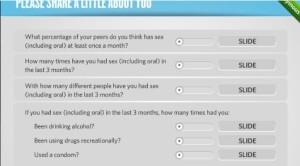NM university will review questionnaire with questions about students’ sex lives

QUESTIONNAIRE CONTROVERSY: Some of the questions for college students on an online program have prompted complaints about invasion of privacy.
By Rob Nikolewski │ New Mexico Watchdog
Officials at Western New Mexico University say a controversial questionnaire that sparked complains elsewhere in the country because it included students giving information about their sex lives and drinking habits will go forward only after it’s been vetted first by WNMU administration.
“We are going to review the questions more carefully going forward,” WNMU public information officer Abe Villareal told New Mexico Watchdog Tuesday after he said he spoke to the school’s dean of students.
The questionnaire is part of a mandatory training program that’s used by 190 colleges and universities called CampusClarity.
The online program was designed to help schools adhere to the federal government’s Title IX requirements and raise awareness about a number of issues, including gender discrimination as well as sexual harassment and assault.
But the computer program also included questions about sex and alcohol and some students complained the questionnaire amounted to an invasion of their privacy.
*What percentage of your peers do you think has sex (including oral) at least once a month?
*How many times have you had sex (including oral) in the last three months?
*How many different people have you had sex (including oral) in the last three months?
*If you had sex (including oral) in the last three months, how many times have you: been drinking alcohol/been using recreational drugs?
*How often do you use alcohol?
*How often do you use drugs recreationally?
*Are you currently sexually active?
*(Yes or no) I have had unwanted sex while drunk or using drugs
*Think of the occasion you drank the MOST this past month. How much did you drink?
Although some of the questions included a green “anonymous” banner across the top of the screen, students at Clemson University complained because in order to complete the one-hour questionnaire they had to use their unique campus ID number to log on. They also had to include their first and last names, email addresses and housing information. Completing the program was mandatory at Clemson.
“Does the university need to know if I had oral or normal sex in the last three months after I’ve been drinking alcohol or using drugs recreationally or if I used a condom during?” a Clemson senior told Campus Reform, a politically conservative organization that first reported the story. “They don’t need to know that for a gender equality questionnaire.”
Three colleges and universities have complained about the questionnaire since the story made headlines and last week Clemson announced it was suspending the CampusClarity program.
“UNDER REVIEW”: Officials at Western New Mexico University are reviewing the questions from a controversial CampusClarity questionnaire.
An Internet search turned up a WNMU news release dated Aug. 16 listing orientation for new students that included “meals, materials, expenses, and the Campus Clarity program.”
Villareal said the dean of students at WNMU was unaware of the controversy until New Mexico Watchdog asked, but said the school will review the program’s questions.
“We do have such a program, but it has not been administered yet,” Villareal said. “We don’t plan to use all of the questions … we can pick and choose. We are going to review it and see what questions are appropriate.”
As for security concerns, Villareal said, “We don’t collect (student) data. We don’t collect personal information. We won’t collect data and don’t plan to.”
New Mexico Watchdog contacted all six of the public, four-year institutions of higher learning in the state.
Spokespersons for New Mexico Tech, New Mexico Highlands and Eastern New Mexico said they didn’t take part in the CampusClarity program. Officials at New Mexico State say they design their own program and a spokeswoman at the University of New Mexico said, “we are researching and deciding on comprehensive online training programs for every member of the university community.”
On its website, CampusClarity says its “Think About It Program” takes a “harm-reduction approach that resonates with students and results in a healthy campus culture that fosters learning and growing intellectually.”
An unnamed official at CampusClarity told the Huffington Post the questionnaire has been in use for three years and it wasn’t until this year that any complaints were made.
One student who doesn’t attend Clemson complained online that students couldn’t complete the questionnaire unless they answered the questions regarding sex, alcohol and drugs.







